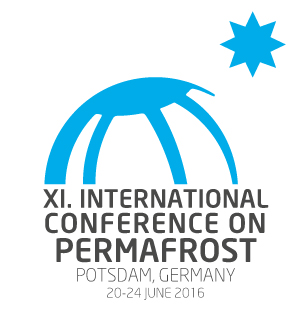Permafrost Conference in Potsdam, Germany

XI. International Conference on Permafrost
From 20 to 24 June 2016, scientists will discuss the changing permafrost regions
The Arctic permafrost regions are among the regions in the world where the consequences of climate change can be felt most strongly. At the 11th International Permafrost Conference (ICOP 2016) from 20 to 24 June 2016 hosted in the Congress Hotel in Potsdam (Germany), more than 600 permafrost experts from around the world will discuss how far the changes have progressed and what new methods scientists have at their disposal to better document and predict the change.
Interested journalists are invited to attend the conference to report and to conduct background interviews with leading scientists and engineers from Russia, the USA, Canada, China, Scandinavia and Germany. The scientific discussion will focus on the following key questions:
• How quickly is the permafrost melting and what are the factors that determine its speed? Findings from the new permafrost temperature measurement network.
• The carbon bomb fairytale: How quickly do microorganisms really break down animal and plant remains stored in the ground ice – and how much methane and carbon dioxide is released in the process?
• Life on the permafrost: How do buildings, bridges and other infrastructure have to be constructed in order to remain stable despite the melting permafrost?
The International Permafrost Conference takes place every four years. The joint organisers of the 11th specialist conference are the Alfred Wegener Institute, Helmholtz Centre for Polar and Marine Research (AWI) in Potsdam, the University of Potsdam, UP Transfer GmbH and the International Permafrost Association (IPA).
For advance or on-site media inquiries, please contact Sina Löschke from the AWI press team (tel.: +49 (0)471 48 31- 2008; mobile: +49 (0)179-133 59 30; e-mail: medien(at)awi.de). We would also be happy to organise an interview with international conference participants for you; in such case, please register your interview request at least six hours in advance.
For information about the conference programme, please visit the event website at http://www.icop2016.org. Background facts about the topic of permafrost are available at http://www.awi.de/en/focus/permafrost.html . During the conference, you will find us at the AWI booth outside the large lecture hall of the conference hotel.
Daily reports, interviews and videos will be made available throughout the course of the conference on the social media channels of the conference (http://www.icop2016.org). These contents will be created in close collaboration with students of the DEKRA University for Media Studies and the Helmholtz Climate Initiative REKLIM (http://www.reklim.de/en.html).
The Alfred Wegener Institute, Helmholtz Centre for Polar and Marine Research (AWI) conducts research in the Arctic, Antarctic and oceans of the high and mid-latitudes. It coordinates polar research in Germany and provides major infrastructure to the international scientific community, such as the research icebreaker Polarstern and stations in the Arctic and Antarctica. The Alfred Wegener Institute is one of the 18 research centres of the Helmholtz Association, the largest scientific organisation in Germany.
Media Contact
All latest news from the category: Event News
Newest articles

Microscopic basis of a new form of quantum magnetism
Not all magnets are the same. When we think of magnetism, we often think of magnets that stick to a refrigerator’s door. For these types of magnets, the electronic interactions…

An epigenome editing toolkit to dissect the mechanisms of gene regulation
A study from the Hackett group at EMBL Rome led to the development of a powerful epigenetic editing technology, which unlocks the ability to precisely program chromatin modifications. Understanding how…

NASA selects UF mission to better track the Earth’s water and ice
NASA has selected a team of University of Florida aerospace engineers to pursue a groundbreaking $12 million mission aimed at improving the way we track changes in Earth’s structures, such…





















